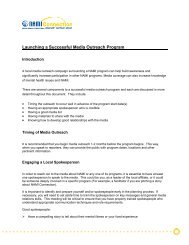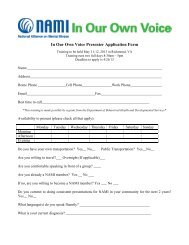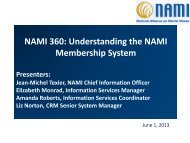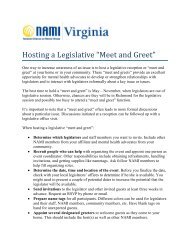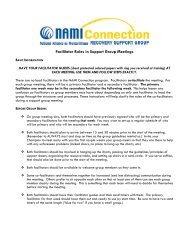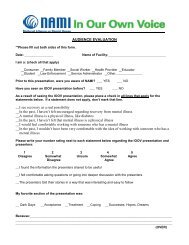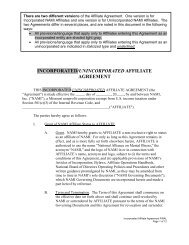Guide Hosting Mental Health Awareness Events
Guide: Hosting Mental Health Awareness Events - NAMI Virginia
Guide: Hosting Mental Health Awareness Events - NAMI Virginia
You also want an ePaper? Increase the reach of your titles
YUMPU automatically turns print PDFs into web optimized ePapers that Google loves.
Ideas for your <strong>Awareness</strong> Event:<br />
<br />
<br />
<strong>Guide</strong>: <strong>Hosting</strong> <strong>Mental</strong> <strong>Health</strong> <strong>Awareness</strong> <strong>Events</strong><br />
Host a NAMI In Our Own Voice presentation targeting a specific group<br />
Host an “Ask the Doctor” session with a local psychiatrist<br />
Host an expert panel for a community forum on a general or specific topic related to mental health -<br />
individuals, family members, treatment or support providers, government officials, etc.<br />
<br />
<br />
<br />
<br />
<br />
<br />
<br />
<br />
Host a free mental health screening at an appropriate location<br />
Donate mental health related books to your local library, have a release party and invite guests and<br />
have snacks<br />
Host an awareness breakfast with legislators on issues related to mental illness<br />
Host a film screening of an appropriate movie and include a moderated discussion following – such as<br />
Canvas, Kings ParkOC87 (NAMI Virginia can provide more suggestions)<br />
Host an art exhibit by individuals touched by mental illness or related to the topic<br />
Host a book discussion. Promote a particular book on the topic and host a discussion event with<br />
snacks/key speaker<br />
Host a contest – request people send in letters or videos about what mental illness has meant to them<br />
and then publicize results. Assemble submissions into compilation to share.<br />
Host a vigil, balloon release (not the best for the environment) or other visually symbolic act<br />
Getting started:<br />
<br />
<br />
<br />
<br />
<br />
<br />
Plan ahead of time. Give yourself at least 2 months to plan, but the more the better.<br />
Consider forming a planning committee to assist you in the process. Only choose reliable, committed<br />
individuals who you can count on.<br />
Consider what resources you or your organization already has at its disposal (this could include<br />
personal, special skills/technology, key contacts, informational resources etc). Allow this to help guide<br />
you on the type of event you would like to host.<br />
Consider community groups who would be interested in partnering with you to host the event and<br />
make contact. Every community group has the potential to market for you, don’t let them say they<br />
can’t help.<br />
Brainstorm your idea. What is the best possible event you can pull off with available/perceived<br />
personnel, resources, time, etc.? Does your plan have the desired outcome you want? Sometimes it is<br />
good to do this as a guided group discussion with interested partners/ volunteers.<br />
At this point you should establish objectives to help guide planning and ensure your event is realistic<br />
and accomplished in the time allotted. What is the reason for the event? What is the event expected<br />
to accomplish for the organization, participants, visitors and community? Itemize the material you will<br />
need to host the event and when you need them. Start to request specific assistance from potential<br />
partners/community members. Be flexible, sometimes partners will offer unique unexpected<br />
resources that may be very helpful but are not part of the original plan. Just be careful not to stray too<br />
far and make sure you have the staff to manage any new adjustments. This is also the point where you
will want to choose a location/site for your event. Be creative but consider important factors that will<br />
encourage/inhibit participants such as accessibility, parking, etc.<br />
Establishing a theme. The theme of your event can usually be established after you have listed and<br />
prioritized your objectives. The theme is a basics statement about the nature of the event. Is it<br />
unique? What is the nature of the program? The theme helps clarify the purpose of your event while<br />
also making it unique and distinct from other events.<br />
Consider revenue options at event. Is an admission fee reasonable? Food/beverage sales?<br />
Consider licensing, insurance, permits and other risk management questions related to your event.<br />
Depending on what sort of event you’re hosting, you may need to investigate the need for a special<br />
license or consider the liability risk to your organization.<br />
Consider the literature and materials you want to provide – ensure you have adequate amount and<br />
breadth to cover your topic.<br />
Once you have a fairly good handle on all details of your plan, develop your cost estimates for the<br />
entire event. Are there fees for the facility, entertainment, food/beverages, licensing requirements,<br />
advertisements and promotional, printing/distribution, etc. Knowing this helps you plan your budget<br />
and your in-kind requests, ensuring that you will actually be able to pull your event off.<br />
Promote, promote, promote! Utilize the NAMI Media toolkit to promote your event<br />
(www.nami.org/publicrelations101) and plan a media strategy. In planning consider, who is going to<br />
come to the event? Where will attendance be drawn from? Does the event compliment or conflict<br />
with other events? Your awareness event is effectual if people actually know about it. Be creative and<br />
utilize everyone. Consider local celebrities or officials to invite. Even those who say know, have been<br />
educated more about mental health from your pitch than before. And they might not say “no” next<br />
time! A caution is to be thoughtful of numbers at the outset and carefully plan to accommodate the<br />
actually number you think you can get to attend. Be creative and thoughtful in how you attract<br />
attendees. Food is always a good idea. But also consider the timing of your event during the<br />
day/week, the length of event and the location.<br />
Maximize your exposure: Take photos at your event, or donation process and send along with a short<br />
summary to your local newspaper for print. Include in your local newsletter or e-newsletter.<br />
**No matter what activity you decide to host, make sure you involve members from your target community in<br />
order to ensure that your plans are relevant, responsive to the community’s needs and as culturally<br />
meaningful as possible.<br />
Opportunities for an Event:<br />
*Google, or web search, these events while planning as many have support or sponsoring sites (such as NAMI)<br />
that will provide templates, logos, resources and support in creating your event.*<br />
National <strong>Mental</strong> <strong>Health</strong> <strong>Awareness</strong> Month: May<br />
National Children’s <strong>Mental</strong> <strong>Health</strong> <strong>Awareness</strong> Day: May 3<br />
National <strong>Health</strong>care Decisions Day: April 16<br />
National Minority <strong>Mental</strong> <strong>Health</strong> <strong>Awareness</strong> Month: July<br />
National Suicide Prevention <strong>Awareness</strong> Week: first full week of September<br />
National <strong>Mental</strong> <strong>Health</strong> <strong>Awareness</strong> Week: first full week of October<br />
Suicide Survivor’s Day: Saturday before Thanksgiving



